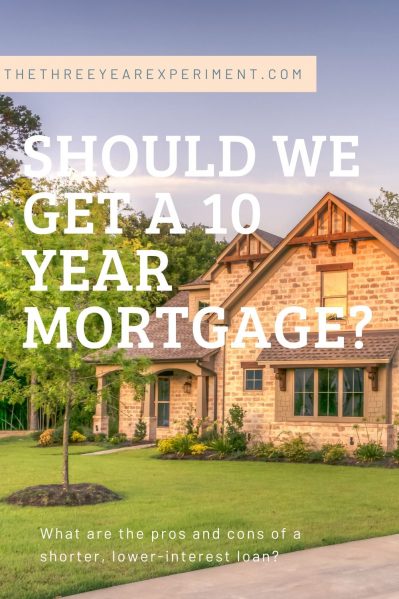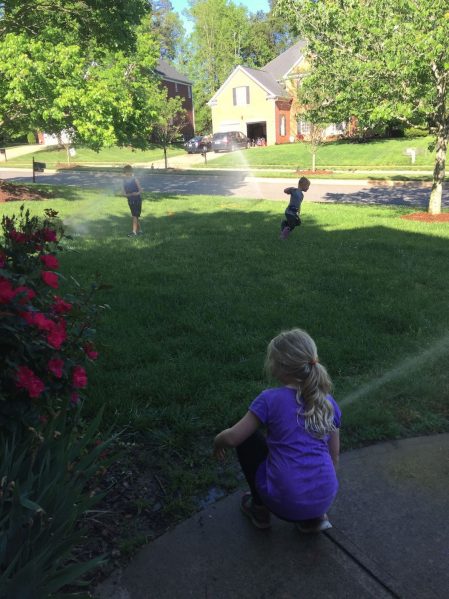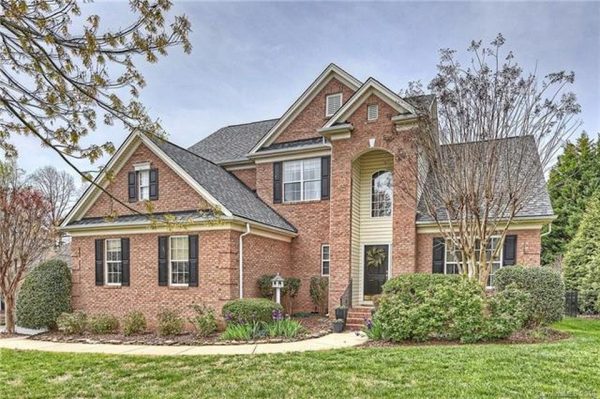Mortgage rates are lower than ever, and when I recently saw that 10- and 15-year mortgages have hit 3% rates, I was intrigued.
Long-term readers of the blog know that we have (and love!) our 15-year mortgage, because it’s allowed us to pay off our house faster and build up more equity than a 30-year mortgage.
I’m also completely aware that those who have a 30-year mortgage tout the benefits of those, including the ability to essentially maintain a super-low interest rate while investing their money in higher-return vehicles like the stock market.
Mr. ThreeYear (especially) and I (less so) tend to be of the more conservative variety, preferring the feeling of having no debt to the feeling of optimizing our investments. One option isn’t better or worse than the other, just different.
When I mentioned to Mr. ThreeYear that we could consider refinancing to a 10-year mortgage at a lower rate, at a monthly payment that we could afford, he was very excited.
So we began to investigate the option of refinancing to a 10-year rate.

Mr. ThreeYear did some research and found a bank with a low, 3% rate. We input our information into the form (it was on Zillow’s website) and sent it off. I did not include our phone number because I didn’t want to receive dozens of phone calls during the school day, something that’s happened before when I put my phone number into other mortgage sites, like Lending Tree.
We got an email in reply from the bank in question, BNC National Bank out of Bismarck, North Dakota. This bank is licensed to provide mortgages in all fifty states, however, and they have a substantial online presence.
The reason we decided to use them is because they offered us a low, 3% rate, gave us a 10-year fixed mortgage option, and waived the need to get an appraisal. Other banks we looked at, such as Ally Bank, offered us higher rates and didn’t have the 10-year mortgage option.
One negative about working with BNC Bank is that there was no online pre-qualification. We had to fill out a complete online application, including Social Security numbers, bank account numbers, occupations, and more, in order to lock in our rate. The online application was very involved and took about half an hour, mainly because I have all of our financial information in one place with Personal Capital. If I didn’t have all of our financials centralized, I suspect it would have taken closer to an hour to fill out the form.
Another negative about BNC is that the mortgage broker we worked with wasn’t immediately transparent about all of the closing costs involved in a refinance. At first, he told us that their origination fee, $1095, would be reduced to $350, but then when I told him that we didn’t escrow our money, he told us that the fee could not be reduced. He neglected to mention any of the other fees involved in the closing.
When I asked him to itemize these fees, I got a clearer picture:
- $1095 Origination Fee (fee the loan company charges)
- $100 Credit Report
- $16 Flood certification
- $110.80 Employment verification (2x)
- $7.50 IRS verification
- $1280.60 Title fees
- $64 recording fees
Total: $2245.90
The national average for closing costs is $4876, according to Lending Tree, or roughly 3-6% of your loan. For us, the total of $2245.90 represents less than 1% of our new loan amount. We have calculated that we will break even on that cost in about 14 months (it will actually be faster than that because our mortgage time will be reduced and we’ll be paying less interest but that’s a worse-case estimate).
We will need more slightly more cash at closing because we will need to pre-pay some of the interest. That amount is $363.70, which will probably change depending on the closing day we choose. We will not set up an escrow account, however (which involves paying several months of homeowners’ and property tax up front) because we don’t escrow those costs.
One of the most annoying and frustrating moments in my life was shortly after we’d bought our house in Atlanta, and our escrow company reached out to let us know our monthly payment would be changing by several hundred dollars per month because of some error they made in the escrow account. No one cares as much about your money as you do, I thought, and we stopped escrowing shortly after. We have never once had to recalculate the amount we were saving for homeowner’s or property tax and I’ve been much happier ever since.
Higher Monthly Payments
As we have contemplated getting a 10-year mortgage, one of the questions that has run through my head has been, “But does it make more sense to refinance to a 15-year mortgage and invest the additional money we’re saving each month?” 3% is such a low interest rate that our money could probably do much better over the time period in the stock market.

Based on our particular situation, however, I think it makes more sense psychologically for us to get used to a higher monthly mortgage payment. Our monthly mortgage payment will now be $450 higher than it was before, which is not an insignificant amount of money. However, given that we tend to spend, rather than save, our extra money, we have learned over the years that forced savings plans work better for us.
By forcing ourselves to adapt to a higher monthly mortgage payment, we will also learn to live on less, and I’m guessing we’ll adjust to the higher payment in just a few years.
Plus, we have a plan to retire when the kids both graduate from school and go to college, so having our house paid off will drastically reduce our expenses on that front. And we won’t need to worry about that cost during retirement.
Interest
Currently, with our 15-year mortgage, we’re paying about $1000 per month in interest. With the new loan, that amount will drop to about $740 and drops rapidly each month. That is exciting because I hate paying that much in interest each month to the bank.
The Flip Side
If we don’t refinance into a 10-year mortgage, we could also refinance into a 15-year mortgage with a lower monthly payment than we have now. We could invest the difference, as I mentioned before, and then use that money to pay off the house when we’re ready to retire. Or, we could keep the mortgage we have now, and keep paying extra on it. Still, this refinance will save us a lot of money in interest over the life of the loan:
- Current mortgage (4%), do nothing, total interest paid: $106,060.25
- New, 15 year mortgage (3%), total interest paid: $71,698.85
- New, 10 year mortgage (3%), total interest paid: $46,825.04
While we haven’t signed the new loan documents yet, we’re well into the process, so it’s very likely we’ll go ahead and refinance.
In the Future
When we paid off our apartment in Chile, I remember being so glad that we had set up a 15-year mortgage, and how grateful I was that somehow, I had done that way back when I had no idea about money.
Will my 50-year-old self be grateful to my 40-year-old self for setting this up? Only time will tell, but I suspect when I make my last payment on the house, I’ll be glad we buckled down and went for the 10-year mortgage.
What are your thoughts? Would you do it? Do you think we’re crazy?



Great post Laurie,
With my wife and I currently in the market to purchase our first home, this has been the constant thought in my mind, especially with the rates being as low as they are. 15 year mortgages are great to build equity, so I can only imagine how much better a 10 year will be. Besides, youve outlined it very clearly above. Your’e saving nearly $60K in interest payments, that’s a win for sure.
Thanks for the great write up,
Regards,
Dr. Dividend
Thanks Dr. Dividend. The building equity part (and saving on interest!) is definitely top of mind. Good luck to you and your wife in your home purchase. The 15 year mortgage has been an amazing friend on our FI journey so I would strongly consider it!!
Best,
Laurie
I just refinanced in September and we were able to get a 2.875% interest rate (15-year mortgage) with I believe lower closing costs than you had. If it were me, I would shop around more.
I agree with refinancing to the shorter term, since it forces you to save–but I would get quotes from more lenders. I think rates went down since we refinanced. The key to my personal success was getting multiple national quotes and bidding them against each other. They were fighting to match and beat each other’s quotes and that saved me at least .25% interest in the end and the lowest closing costs. That .25% adds up to a LOT over 10 years.
We ended up ultimately going through Sofi. Since I had an account there when I refinanced student loans years ago, I got a “member” discount with them (even though the loans have been paid off for 3.5 years now).
I also got a quote with Ally (as I see you did) and what was our current lender Aimloan.com.
I checked bankrate.com and put in my details for refinancing (without giving out my phone number or email) and personally contacted the top couple lenders for my situation. I think overall I got 4 quotes. And I literally had them fighting over my business! I’d send them my loan estimate from one company and they’d beat it and I’d send it back to the first company to match/beat. It was AMAZING. Definitely worth the time spent.
Ultimately, I checked my quote with a local guy and he said he couldn’t even come close to matching it and said basically, I got an incredible deal and to go for it!
I hope this helps you out!! I’m in NC too, in the Raleigh area. Email me personally if you need more info.
Tamara, this is excellent advice. Your few hours’ negotiations saved you thousands. We (unfortunately) already locked in with this lender. One of the things I’m terrible at is shopping around because I’m so impatient.
Paying off the principal is a form of saving. Paying interest is an expense. By restructuring, you are doing a nice job decreasing your costs and increasing your savings.
Once you finish the mortgage, you will have tremendous freedom regarding how you use your income. It will make a huge difference to your life. You’ll be glad you did it. When I paid of my mortgage (early), it was the most positive thing in my financial life for a decade.
Thank you so much for your words of wisdom from the other side. It really makes me feel good to hear that someone else who is already at the end of their payoff felt so strongly positive about it!